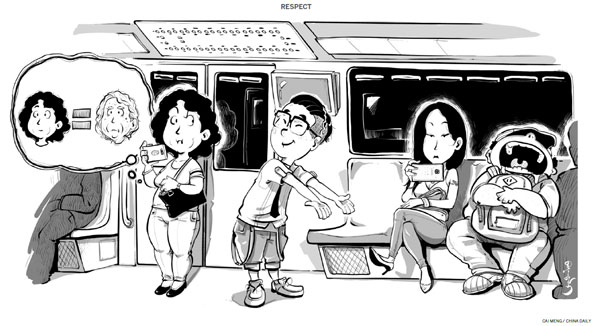Respect? no thanks. just use my name
Showing care for seniors is nice, but we can do without the hurt feelings
"Congratulations, you're getting a promotion," my friend blurted over the phone the other day. I was confused; I had no idea what she meant. "My son's having a baby," she added excitedly. "You're going to be a grandma."
"Wow. Congratulations," I said, although what I was thinking was, "Am I that old?"
It sounded weird being called nainai, grandmother. It's such a respectable title in China. Right now, I don't feel like being respected. I may be too old for my friend's son to call me sister, but I'm sure I'm too young for anyone to call me grandma.
Many people I know have had a similar experience with these "respectful" titles.
I still remember the reaction another friend had to when she was called ayi (auntie) by a female vendor while shopping at a flower market. At the time my friend was in her 40s, and the market trader did not look much younger. My friend was so upset she immediately turned away, saying: "I swear, I won't buy anything from her."
In China, our tradition is to show great care to seniors, in public and in private, and whether they are family members or not.
I have an aunt who is only three years older than me, but as she ranks as my senior I'm required to call her auntie. When we were teenagers, she was very proud when others addressed her as Xiao Yi (Little Auntie), although I was always reluctant to use it. When we grew older, however, she rejected the title and asked instead that we call her by name. She said it felt more comfortable.
Respecting the elderly and taking care of the young is one of our moral standards. Yet trying to live up to it can hurt people's feelings.
"Do I look very old?" a colleague asked me recently after she had just arrived at the office. "Someone on the bus offered me their seat today."
Yes, she may look a little plump, and OK, her head has a few gray hairs, but the woman is not even 50 years old. "Today is really a bad day," she said.
Her experience shows another truth: If you really want to help someone, don't let him or her know about it. Do it naturally. For instance, if you want to offer an elderly person your seat on a bus, just stand up and walk away. Pretend you're getting off.
And it's not only women who struggle with our age-related titles.
"I'm so angry. Someone called me daye today," a male friend once said. Daye translates as elderly uncle, and to add further insult he had also been called laoxiansheng, which basically means old man. "Why do they have to add the 'old' part?" he said.
That was a decade ago, when he was in his early 50s. Recently I asked him how he felt about the titles. He replied, "It's just the typical Chinese way of showing respect. I got used to it."
In the office, my 20-something colleagues have also been recalling to me their shock upon being called ayi or shushu (also uncle) for the first time. No matter the generation, it seems these titles solicit the same reaction.
I went to visit my newborn "grandson" for the first time on a Sunday morning. He was 40 days old. "Hi. Say hello to grandma," I joked. I got no response, just a stare. After I left, I bumped into a girl of about 4 in the elevator. "Ayi, ni hao," she greeted me. "Wow, ni hao. You're so sweet," I replied. I had just gone from grandma back to auntie in 20 minutes.
I will be suggesting to my friends - as well as their children and grandchildren - not to give me any respectable titles. Just use my name.



















